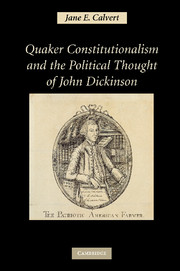Book contents
- Frontmatter
- Contents
- Acknowledgments
- Abbreviations
- Introduction
- I QUAKER CONSTITUTIONALISM IN THEORY AND PRACTICE, C. 1652–1763
- 1 Bureaucratic Libertines: The Origins of Quaker Constitutionalism and Civil Dissent
- 2 A Sacred Institution: The Quaker Theory of a Civil Constitution
- 3 “Dissenters in Our Own Country”: Constituting a Quaker Government in Pennsylvania
- 4 Civil Unity and “Seeds of Dissention” in the Golden Age of Quaker Theocracy
- 5 The Fruits of Quaker Dissent: Political Schism and the Rise of John Dickinson
- II THE POLITICAL QUAKERISM OF JOHN DICKINSON, 1763–1789
- Bibliography
- Index
- References
1 - Bureaucratic Libertines: The Origins of Quaker Constitutionalism and Civil Dissent
Published online by Cambridge University Press: 27 July 2009
- Frontmatter
- Contents
- Acknowledgments
- Abbreviations
- Introduction
- I QUAKER CONSTITUTIONALISM IN THEORY AND PRACTICE, C. 1652–1763
- 1 Bureaucratic Libertines: The Origins of Quaker Constitutionalism and Civil Dissent
- 2 A Sacred Institution: The Quaker Theory of a Civil Constitution
- 3 “Dissenters in Our Own Country”: Constituting a Quaker Government in Pennsylvania
- 4 Civil Unity and “Seeds of Dissention” in the Golden Age of Quaker Theocracy
- 5 The Fruits of Quaker Dissent: Political Schism and the Rise of John Dickinson
- II THE POLITICAL QUAKERISM OF JOHN DICKINSON, 1763–1789
- Bibliography
- Index
- References
Summary
The Quakers' conception of a political constitution and their understanding of acceptable forms of civil dissent were based on their theology, ecclesiology, and experiences with the English and Massachusetts governments during the Interregnum and Restoration. This chapter gives an overview of the religious structures and processes that were evolving in Quaker society in the mid-1650s through the 1670s and that informed their political thought.
The Quaker ecclesiastical polity was animated by a bureaucratic process that determined how the members of the meeting related to each other and to the world outside their Society. If we think of their authority and their modus operandi in Weberian terms – legal-rational, traditional, or charismatic – it does not fit into any one of these categories; rather it rejected the second and is an amalgam of the first and the third. It was not a category Weber envisioned, and it can be described most simply as a “legal-charismatic” model. It was based on the “rule of law,” but instead of being rooted in rationality, as Weber's model is, it was based on charisma. Further, rather than this charisma being unique to one individual, it was found in each member of the group. There was a paradox in Quaker theologico-political thought and expression that is captured in the name “bureaucratic libertines.” Their bureaucratic process was designed to produce charismatically based unity and dissent in the ecclesiastical and civil polities, and with both of these things aimed at the same purpose – discovering God's law.
- Type
- Chapter
- Information
- Publisher: Cambridge University PressPrint publication year: 2008

